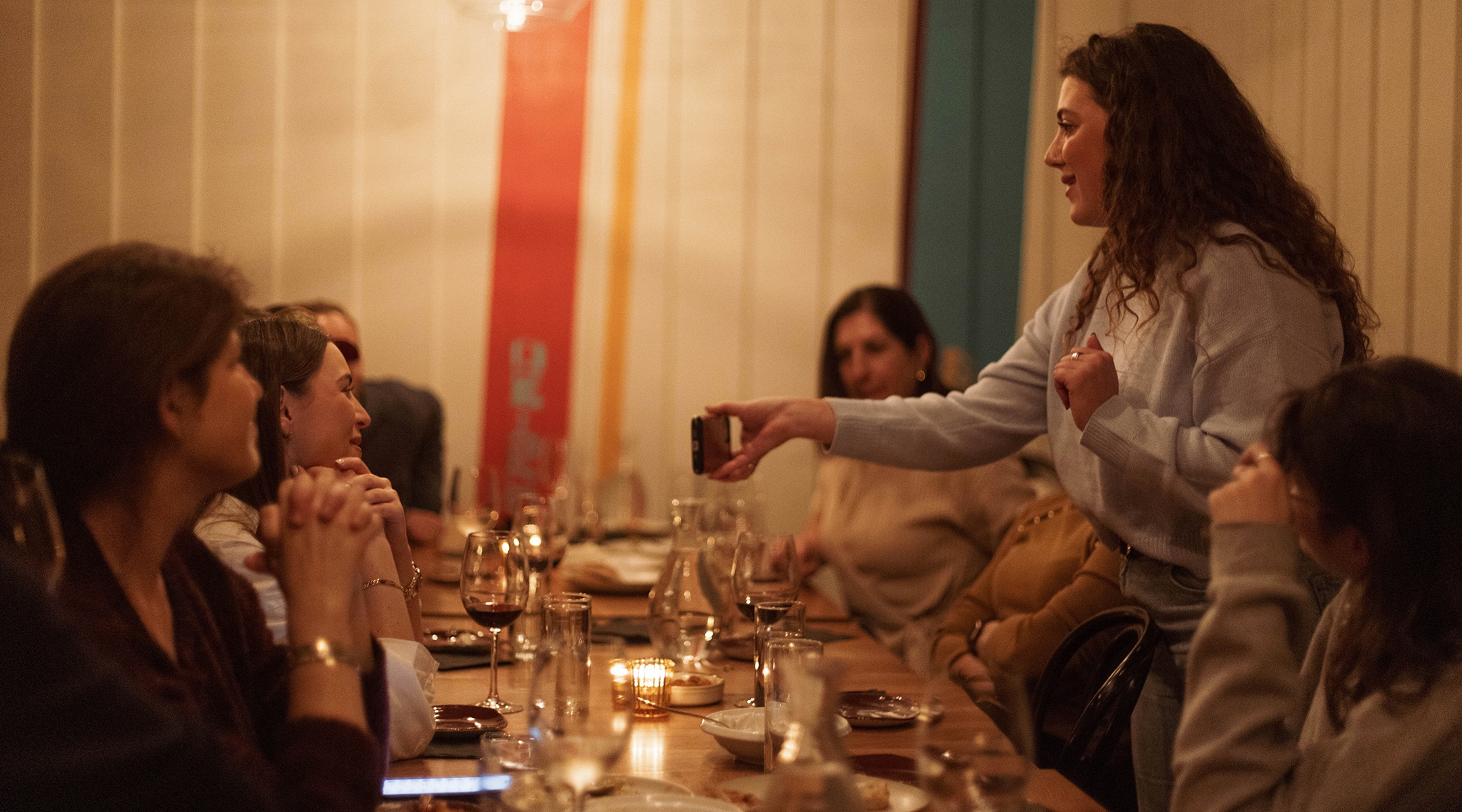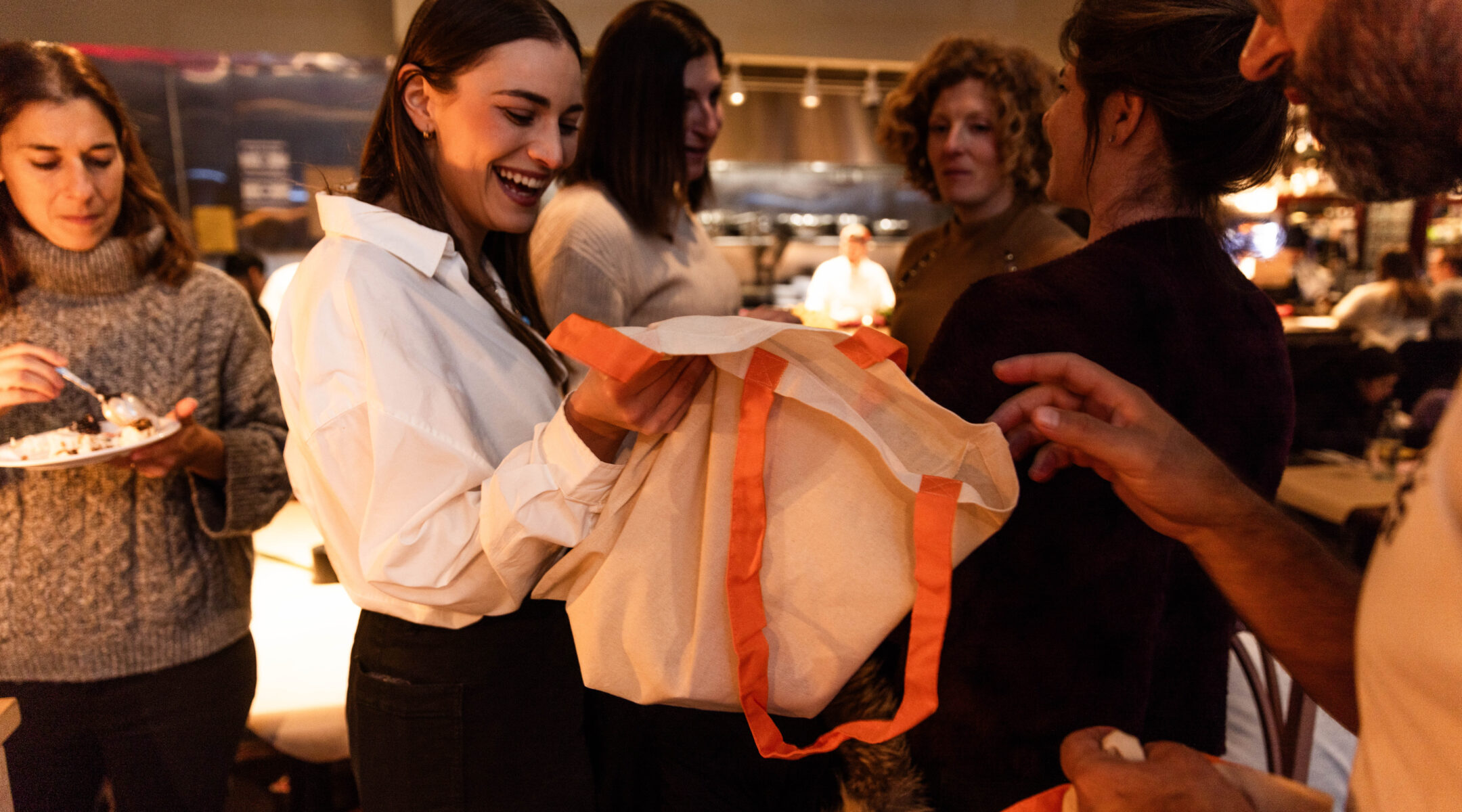(New York Jewish Week) — It was a damp, dreary Tuesday evening in Manhattan, but inside the Greenwich Village outpost of Caffe Aronne, the vibe was warm and friendly as a group of 10 people, nearly all of them women, shook off their umbrellas and introduced themselves to one another.
Most of us were strangers, but we became fast friends over the next few hours as we walked from one downtown Israeli restaurant to the next, sharing details of our lives with one another alongside plates of food. The 10 of us had assembled for the first-ever Delicious Cities tour in New York, a new domestic food tour initiative from Inbal Baum, the founder of Delicious Israel, a company that specializes in food tours of Israel.
Baum, who founded Delicious Israel in 2011, had made a lightning-quick business pivot to New York City-based tours after the Oct. 7 attack by Hamas terrorists and the subsequent war in Gaza brought tourism in Israel to a standstill. “Besides the incredible trauma, incredible heartache, incredible pain of everything going on, as a tourism business, and as a tourism business owner, it’s another layer of trauma,” Baum told me.
“Interestingly, in the pandemic, the entire world was shut down,” she added, referring to a previous massive blow to her business. “Now it’s just Israel.”
But Baum quickly clarified her remark: Day-to-day life in Israel is not shut down, it’s just that the tourists have stopped coming. “Everything is open — well, not everything, but things are open,” she said. “We can do tours, our guides would be happy to show someone something positive and be part of the positivity that we love so much to share.”
She also thinks there is an appetite not only for Israeli food but for supporting Israelis, wherever they live. “The enthusiasm that I saw when we did a virtual cooking event with The Nosher and 250 people showed up to be together, and to share that moment together around food, was so inspirational and so powerful,” she said, referring to the Oct. 25 gathering as well as other online, food-focused gatherings she’s hosted since the war began. “I knew that that was the direction we had to go: how to bring people together in a way that speaks to what’s happening right now.” (The Nosher and the New York Jewish Week have the same parent company, 70 Faces Media.)
Baum — who said she considers herself American-Israeli when she’s in Israel and Israeli-American when she’s stateside — currently lives with her family in Park City, Utah but lived and worked as a lawyer in New York for six years. In October, she assembled a small team of Delicious Israel guides in New York City and began creating a strategy around tours. “We spent a day running — literally knocking on doors,” Baum said about how she got restaurants to participate. “In the doors that we knocked on where people answered, they were like, ‘We want to be a part of this, we want to support this.’”
Now working in the fickle business of Manhattan restaurants, Baum and her team are still figuring out the details: Since the test tour this reporter attended ahead of Thanksgiving, the itinerary has changed slightly, Baum said. But, for now, Delicious Cities is running an approximately three-hour Manhattan tour of West Village Israeli restaurants for $160 — with an optional addition of $40 for alcoholic beverages — on Tuesday and Wednesday afternoons. There are also tours being planned for Brooklyn and Philadelphia.
When asked why it was meaningful for her to support Israeli restaurants stateside, Baum said she’s always cared about the industry and added, “Now just happens to be a time where we are, unfortunately, having to explain our existence. And so, in my eyes, food has always been the way that we’re able to come together, provide support, provide love.”
That feeling of togetherness was palpable last month as our group — which included a few of Baum’s old friends, some Delicious Israel regulars and two New York Jewish Week journalists — toured Israeli eateries downtown. We began our time together with an icebreaker: Standing in a tight circle inside the tiny Caffe Aronne, participants took turns introducing themselves to the group and sharing a favorite food memory of Israel. Two people mentioned a kubeh selek, a beet soup with meat-filled dumplings, and one woman shared an entertaining story of consuming a few too many shots of arak on a trip to Israel at age 15.
At the time of our visit, Caffe Aronne had just been in the news for the outpouring of support it received from local Jews when employees allegedly quit the cafe’s Upper East Side branch in protest of the business’s pro-Israel stance. (The story, it turned out, was a bit more nuanced than it first seemed.) Barista Luis, who did not provide a last name, was employed at a different cafe on the day the story broke. He volunteered to pitch in, serving some 500-600 customers that day, he said, and he has stayed with the Israel-inspired cafe since.
“I like the vibe, the people,” he told us.
At Aronne, the tour participants had a choice between two special lattes: cardamom pistachio or almond rose. Neither of these drinks were on the compact menu, a reporter pointed out — and that’s by design, explained Baum, as many of the offerings presented on the tour are off-menu or specially curated for the group.
Tour guide Jordana Meyer gave us a quick rundown of the evening. Explaining that New York is a “chik-chak city” — a Hebrew phrase akin to “pronto” or “chop chop” — she said we would be keeping a brisk pace.

Getting to know one another is a key part of the Delicious Cities experience; here, guide Jordana Meyer shares with a tour group. (Shai Hansav, courtesy Delicious Israel)
Our next stop was Kubeh, Chef Melanie Shurka’s Sixth Avenue restaurant that’s dedicated to “lesser-known cuisines of the Middle East,” per its website — hand-rolled dumplings, or kubeh, in particular. As we sipped on a wickedly good, almost healthy-tasting cocktail called The Persian — with gin, Persian cucumber and zaatar — and snacked on hummus, muhammara and pita, Shurka told us a bit about her passion for the dumplings. “Kubeh, kibbeh, kabbah — they’re all the same,” she said, explaining that the word comes from the Arabic verb meaning “to roll, make something round.”
Shurka, whose father is Israeli and mother is a Jewish New Yorker, told us how she learned her techniques from Israeli grandmothers. “This is a special place,” she said of her six-year-old restaurant as she served the group both fried kubeh and kubeh in broth. “It’s my first baby. My second was born a year ago.”
Next, it was a short, drizzly walk to Einat Admony’s Balaboosta, where a bartender had laid out a spread that included whipped feta with silan (date syrup), hummus, fresh pita and the restaurant’s signature fried olives. Participants drank Israeli wine and milled about.
“This is Israeli and Jewish spirit and resilience at its finest,” said Eilon Gigi, who had worked for celebrity Israeli-American chef Michael Solomonov in Philadelphia for several years before joining the Delicious Israel team.
Admony — wearing a bright-orange cap emblazoned with the word “Yalla!” — greeted the group as well. Later, when a reporter asked her how her business was faring in a time of unrest and increased antisemitism throughout the city, the chef responded that Balaboosta has been “very busy.”
“Our community is stronger than hate — we are all doing fine,” Admony said of Israeli and Jewish restaurants in the city.
And yet, Admony said she unabashedly welcomes the extra business brought in by a Delicious Cities group. “It’s New York,” she said. “We always need business.”
Our fourth and final stop was for dessert at Port Sa’id, a restaurant from freshly Michelin-starred Israeli chef Eyal Shani that opened just north of Tribeca over the summer. Chef Victor Gothelf greeted us warmly and gave a short spiel about the restaurant, where dishes are “prepared today, made today, salads cut today.”
Then, in true Shani style, Gothelf glopped a mess of desserts — including Basque cheesecake, apple crumble and a vegan malabi — directly onto a table covered with butcher paper, then topped the whole thing with strawberry sauce, blackberries, powdered sugar and more. It was a visual feast, as well as an actual one, and Gothelf encouraged us to dig in and share. As he stepped away, he said to our group, in Hebrew, “Am yisrael chai” — the Jewish people live.
With its combination of “really good food — pure, not complicated — and really good music,” Port Sa’id aims to “bring people together,” Gothelf told me later in the evening.
“People are afraid,” he said when asked about the highly charged climate in the city, “but we won’t back down.”
Gothelf added that he jumped at the chance to add Port Sa’id as a part of the new Delicious Cities tour. “Especially because of the situation right now, I was so happy and eager to be a part of it,” he said.
As the evening drew to a close, tour participants gathered again in a tight circle, this time with our bellies full and glasses of wine in our hands. We took turns sharing a personal highlight of the experience — several people homed in on the the feelings of camaraderie within the group, saying that at a time of so much turmoil in Israel, it felt good to gather with other Jews in Israeli spaces and break bread. Business cards and hugs were exchanged and, solo or in pairs, participants departed the bustling restaurant and headed out into the dark, rainy New York night.
Looking ahead, Baum hopes to attract “anyone who is interested in good food, in supporting these restaurants and learning something new and doing something fun.”
“I’m a Jewish mom,” she explained. “I’ve been a Jewish mom way before I was a Jewish mom. I have an instinctual desire to feed people and to have them fed.”
The New York Jewish Week brings you the stories behind the headlines, keeping you connected to Jewish life in New York. Help sustain the reporting you trust by donating today.





